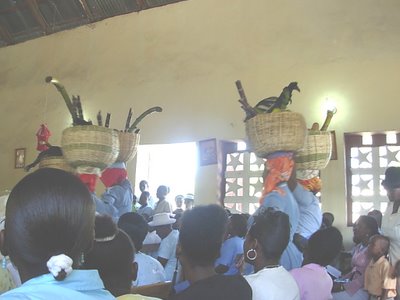There's no running water or electricity.
Work barely stops, though there's a relaxed pace to it. Kids have time to play, but a lot of their day is work too.
School is a great idea on paper, but the learning is all by rote, the books are ancient, and it can sort of get in the way of survival sometimes, so it's not the highest priority.
Every night I ate and then later read by the light of a kerosene lamp.
And, people refuse to smile for photographs.
Seriously, these are some of the smiliest people I've ever met. They would be all giggly getting into position to pose for a photo, and then as soon as I start counting, everybody goes stoic on me. For example, here's what grandpa looks like:

Here's what he looks like when he's aware his photo is being taken:

For the most part, life for people out there has hardly changed in 200 years. I washed my clothes by hand. I harvested rice. I thumbed dried indian corn off the cob so it could be ground, by hand, into meal. In some ways Haiti is the least stable country in the hemisphere. In some ways it's the most stable.
But it wasn't all Little House on the Prarie the whole time. For example, two sundays ago there was a national election for magistrates. There was a polling place in Dezam, the town of a few thousand people where MCC's reforestation office is based. My homestay was in the village of Christan, about 4o minutes uphill on foot. I walked down to Dezam that morning to attend the Catholic mass with Jean-Remy, one of MCC's Haitian staff.
Actually, let me digress here a minute. It was a special sunday to honor the patron saint of Dezam, so mass began at 9:00am instead of 6:00am which is usually (!) the case. There were lots of decorations and people were taking photos with a cheesy painted beach scene outside of the sunday school building. Big special day. During the service, as the choir worked through an extra long and happy number, six women with baskets on their heads came and slowly sashayed from the back to the front.

The baskets were full of fruits, veggies and sugar cane, and two of the women even added live turkeys to the mix. The homily was nice. It stressed the people's duty to vote, to vote not for friends, or friends of friends, but for candidates who were honest and who cared about the needs of all Haitiens. At one point in the service, during a calm moment, I remember hearing some commotion outside. But soon the choir was singing again and I thought nothing of it.
Afterwards, I was invited to the priest feast. It was myself, Jean-Remy and his wife, the padres, and a couple dozen others.

Apparently, being the only "blan" in the place obliged me to pour the champagne you see there for everyone. No mishaps, fortunately, except I probably shouldn't have given any to the girl that looked about 16. Or her brother who was in his early teens (I hope). But their dad didn't seem to mind, and it was only a little.
After about an hour of feasting, I walked fat and happy back up the hill to Christan. On the way I met one of the guys from the rice harvest. He told me that the election had been disqualified in Dezam because it was violently disrupted. A truckload of guys showed up waving revolvers and a couple of shotguns and started turning over tables. They ripped up ballots and fired in the air to scare people away. One man was shot in the hand. I even heard from a couple of people later on that a man had been killed.
Two miles down the road to the Port-au-Prince was the administrative office for the election. My Creole tutor was working there as a volunteer monitor for the Lespwa (hope) party, which currently holds the presidency and is supported by a legitimate majority of Haiti's poor, which is to say a legitimate majority of Haitians. Around the time of the disturbance in Dezam, monitors from several non-Lespwa parties began tearing the office up. Weapons were brandished. Ballots were burned.
And the most scandalous, in my opinion, is the fact that in both of these situations, the armed UN soldiers -- dispatched to ensure calm and security during the election -- ran. I'm a pacifist. I'm not saying that I wish the UN soldiers had started mowing down these "vagabonds" (as villagers would always refer to the thugs). But it certainly begs the question: what in the hell is the UN doing here?
8,500 armed personnel. $500 million a year. You see them everywhere you go in Port-au-Prince. A couple of soldiers from Brazil, China, the Philippines, Senegal or wherever sitting atop a tank-like vehicle or a big jeep, chain-smoking, hands gripping a gun big enough to take down a helicopter. Just watching the cars and foot traffic go by. How does that make anyone feel safer? The posh neighborhoods uphill from PAP have a ridiculous real estate bubble inflated by all these blue helmets who need somewhere to live, and whose housing costs are covered despite already high salaries. I don't know how much the UN soldiers make, but I know that starting pay for UN policemen is $90,000 a year. It's high because there are bonuses for serving in such "dangerous" circumstances. Several reports have found that some of the worst human rights abuses in Haiti are being perpetrated by these soldiers. Should we be surprised? The commander of the Chilean contingent has been linked to some of the most heinous violence that occurred under Pinochet.
Please challenge this if I'm wrong, but as I understand it Haiti is the only country, now or ever before, to be occupied by the UN without a civil war. There's not even the threat of civil war here, not even close. Sure, there's gangs and a drug trade -- but nothing like as bad as it is in parts of Brazil, as one example. And yet Brazil gets to spearhead this mission that benefits nobody except the tiny wealthy Haitian elite that owns all the rentable real estate. That's a little simplistic. Other people benefit, but certainly not the average Haitian. I could go on, and I will, but I should save it for some future post.
So back to the election. Sounds like what happened is for some reason the secrecy of the ballot in the Dezam precinct was compromised. Some fanatical supporters of the opposition parties got word from the monitors that the election wasn't going their way, and decided to disrupt. The whole thing is really complicated, and I don't know how to resolve this kind of problem, beyond the no-brainer of ensuring that votes are kept secure and secret until after the election. But this is exactly the kind of thing I'll be working on in my job, which began today.
But while I'm on the political note, I have to mention this too. Remember grandpa from the pictures above? He's a charming, gentle, very likeable old man. His sandals are made from an innertube that was cut into strips and artfully woven into something wearable. Grandpa used to be the most feared man in Dezam. Let me explain: The Duvalier dynasty ruled Haiti with an iron fist from the 50s to the 80s. They’re responsible for the murder of tens of thousands of Haitians. Most of these murders were carried out by the ‘tonton macoutes’ – Creole for boogeymen. It was an all-volunteer army, untrained, uneducated, but armed and loyal to noone but the dictator. Their only objective was to intimidate and squelch any kind of political dissent whatsoever. For this loyalty, they were given carte blanche to confiscate any property they saw fit and inflict any violence they thought necessary, with absolute impunity.
I discovered just before I arrived at my homestay that Matt and Esther, the Canadian couple that does reforestation with MCC, had recently gotten this info. We really don’t know the extent of grandpa’s activities with the Macoutes, but we know that he did beat the hell out of a lot of people in and around Dezam back in the 70s. The whole thing really got me to thinking – how could this sweet old man, who couldn’t have weighed more than 150 pounds in his prime, do such things? And moreover, how did he get away with it? Was it fear of further reprisals that kept the villagers from exacting revenge? Did poverty train them to accept it as part of life in an unfair world? Does the church bear any responsibility?
Nowadays, grandpa is beginning to succumb to dimentia. I'd like to think that this is because somewhere deep down he wants to forget the horrible things he's done. But realistically, most everyone, myself included, find it all to easy to justify their moral shortcomings.
Okay, sorry this post is so long. I've got lots more photos and thoughts, but I'll post those later. One last little bizarre tidbit for now. One day, sitting on the porch of my homestay, I observed their horse scraping it's teeth against the limestone bedrock (which due to erosion is visible over about a quarter of the front yard) looking for pieces of loose dirt, and then eating the loose dirt it could find. I was baffled. This horse wasn't in as bad of shape as a lot of the bony nags you see andeyo. Plus there were decent patches of grass just a couple of feet away. I turned to my friend Jackson and asked, "Hey Jackson, why is the horse eating dirt?"
"Oh that? That's because the horse needs minerals that are in the earth."
"Are you sure about that?"
"Yeah. Earth has lots of good minerals, which is why people eat it."
"People!? People eat dirt here?"
"Yeah. Especially pregnant women."
"What? Do you eat dirt?"
"Sure. Everyone does."
I tried to unfurrow my brow and not think too much about what I had just heard. Ten minutes later Jackson showed up with something in his hand. "Felix, do you want to try some for yourself?" He held out what looked like a couple of light grey meringues: flat on the bottom and dollop-shaped. I thought, maybe I misunderstood him earlier. These didn't look so bad. And shoot, I'll try anything once. I took a taste, and guess what? Tasted like dirt. On the salty side, sure--but still dirt. I couldn't help my grimace as I handed this earth-cookie gift back to Jackson and told him I wouldn't be having any more. Apparently my cultural sensitivity stops somewhere between tasting dirt and eating dirt.
